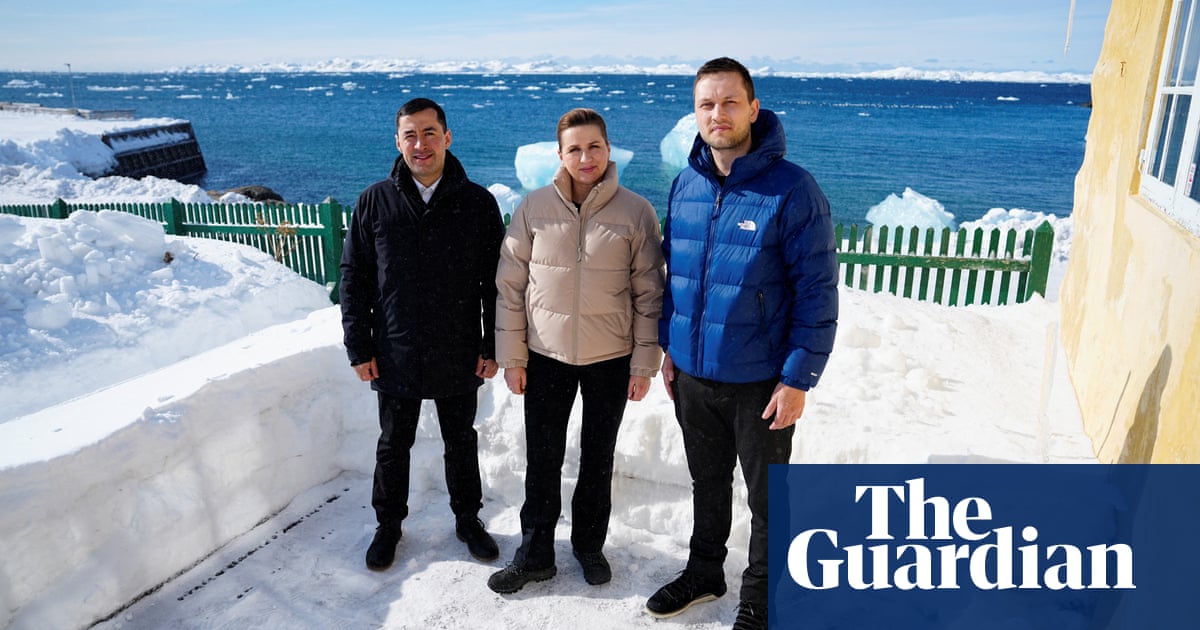Israel orders negotiators back to Qatar for next stage of ceasefire talks
Israeli prime minister Benjamin Netanyahu ordered negotiators on Saturday to return to Qatar to continue ceasefire talks with Hamas after the fifth hostage-prisoner swap agreed under the truce was completed, the Agence France-Presse (AFP) news agency reports.
Netanyahu repeated his pledge to crush Hamas and free all remaining hostages, denouncing the militant group as “monsters” after the handover of three captives in Gaza who appeared emaciated and were forced to speak on a stage.
As we mentioned in the opening summary, the hospital treating the three Israeli hostages released from Gaza on Saturday said Or Levy and Eli Sharabi were in a “poor medical condition,” while Ohad Ben Ami was in a “severe nutritional state”.
Of the 183 inmates released by Israel in return, the Palestinian prisoners’ club advocacy group said seven required hospitalisation “as a result of the brutality they were subjected” to in jail. Rights groups and whistleblowers have described a policy of “institutionalised abuse” in Israeli jails and detention centres.

Key events
A journalist from the Agence France-Presse (AFP) news agency in the Netzarim area of Gaza, which controls key access points between the territory’s north and south, has confirmed that no Israeli forces were present on Sunday.
AFP journalists saw cars, buses, pickup trucks and donkey carts travelling on Salaheddin Road from both the north and south, crossing the Netzarim Corridor where an Israeli checkpoint used to stand.
Asked about Sunday’s withdrawal, an Israeli security official told AFP: “We are preparing to implement the ceasefire agreement according to the guidelines of the political echelon.”
Here are some of the latest images coming out of the newswires as hundreds of Palestinian people start returning to northern Gaza after Israeli troops withdrew from the Netzarim Corridor:
Pregnant Palestinian woman killed by Israeli forces in West Bank – ministry
A pregnant 23-year-old Palestinian was killed by Israeli security forces on Sunday in the Nur Shams refugee camp in the occupied West Bank, the Palestinian health ministry has said.
Sundos Jamal Mohammed Shalabi, who was eight months pregnant, was killed by Israeli gunfire, the ministry said in a statement, adding that the foetus also did not survive and that Shalabi’s husband was critically injured.
The Palestinian state news agency cited eyewitnesses as saying that Shalabi and her husband were shot by Israeli forces as they were trying to leave their home.
The Israeli military had said it was expanding its rain in the north of the West Bank to Nur Shams, a refugee camp close to the Palestinian town of Tulkarm.
Israel’s military, police and intelligence services started the deadly raid in Jenin on 21 January, claiming it was targeting terrorists. The raid has expanded to Tulkarm, Al Faraa and Tamun.
Since the start of Israel’s war in October 2023, which has sparked a wave of violence in the West Bank, Israel has raided or carried out airstrikes in Jenin multiple times, killing dozens and leaving a trial of heavy destruction there.
The UN has expressed concern that the ceasefire in Gaza could be endangered by Israel’s military tactics in the West Bank, which have involved what the UN human rights spokesperson labelled “unnecessary or disproportionate use of force”.
Israeli military completes withdrawal from Netzarim Corridor
The Israeli military has completed the withdrawal from the Netzarim Corridor, that bisects the northern and southern halves of the Gaza Strip, to the buffer zone. Under the terms of the ceasefire agreement with Hamas, the Israeli military is supposed to withdraw completely from the corridor, which stretches to the Mediterranean Sea, and allow free movement back and forth between the south and the north of the territory.
As of now, cars are passing an inspection point, as they arrive from the central and southern parts of the Strip.
The Netzarim Corridor is an area that has in the past 15 months turned into a major base for the Israeli military. It is now completely pulverised, with no buildings left.
The majority of the agricultural land has been bulldozed and destroyed by the Israeli military.
It will be very difficult for people who were displaced from this area to return to their homes. It’s hard to imagine where they are going to stay here other than just setting up tents here and there.
So we’re seeing more civilian movement between the north and the south.
The hope is now that with the withdrawal of the Israeli military, there is more free movement, a flow of vehicles and aid trucks going all the way to the northern part of the Strip.
The Gaza ceasefire deal, which came into effect on 19 January, aims to bring a permanent end to Israel’s war and free hostages held by Hamas in Gaza in exchange for Palestinians detained by Israel. Negotiations on the second stage of the fragile three part agreement are set to begin on Monday.
The following is from this report by the Guardian’s senior international affairs correspondent, Emma Graham-Harrison, who adds some more detail about the negotiations:
Netanyahu has ordered a delegation to Qatar to discuss “technical matters”, but no substantial talks will start until after he returns from Washington for a security cabinet meeting on Monday, Israeli media reported.
A third stage would see the reconstruction of Gaza, but the process has been thrown into turmoil by Trump’s shock suggestion that the US should take over the territory and Palestinians be resettled elsewhere, prompting the UN secretary general to warn of ethnic cleansing.
Israelis were also angered by a Hamas ceremony that saw the frail-looking men forced to make statements on a stage in Gaza before they were taken to waiting buses.
Israel orders negotiators back to Qatar for next stage of ceasefire talks
Israeli prime minister Benjamin Netanyahu ordered negotiators on Saturday to return to Qatar to continue ceasefire talks with Hamas after the fifth hostage-prisoner swap agreed under the truce was completed, the Agence France-Presse (AFP) news agency reports.
Netanyahu repeated his pledge to crush Hamas and free all remaining hostages, denouncing the militant group as “monsters” after the handover of three captives in Gaza who appeared emaciated and were forced to speak on a stage.
As we mentioned in the opening summary, the hospital treating the three Israeli hostages released from Gaza on Saturday said Or Levy and Eli Sharabi were in a “poor medical condition,” while Ohad Ben Ami was in a “severe nutritional state”.
Of the 183 inmates released by Israel in return, the Palestinian prisoners’ club advocacy group said seven required hospitalisation “as a result of the brutality they were subjected” to in jail. Rights groups and whistleblowers have described a policy of “institutionalised abuse” in Israeli jails and detention centres.
Opening summary
Welcome back to our live coverage of the latest news from the Middle East, here are the latest updates.
Israeli prime minister Benjamin Netanyahu has ordered negotiators to return to Qatar to discuss the next stage of the ceasefire deal with Hamas after the fifth hostage-prisoner exchange was completed on Saturday. Substantial talks are not expected to start until after a security cabinet meeting on Monday, Israeli media reported.
The hospital treating the three Israeli hostages released from Gaza on Saturday said Or Levy and Eli Sharabi were in a “poor medical condition”, while Ohad Ben Ami was in a “severe nutritional state”. With their return, 73 out of 251 hostages taken during the attack now remain in Gaza, including 34 the Israeli military says are dead.
The Palestinian prisoners’ club advocacy group said of the 183 inmates released in return, seven required hospitalisation and described “brutality” and mistreatment in jail.
Hamas accused Israel of “systematic assaults and mistreatment of our prisoners”, calling it “part of the policy of … the slow killing of prisoners”.
The fifth exchange since the truce took effect last month comes as negotiations are set to begin on the next phase of the ceasefire, which could pave the way for a permanent end to Israel’s war on Gaza.
In some other key developments:
-
Five Thai hostages released by Hamas last weekend have arrived back in Bangkok amid tearful scenes of joy in the capital. The five farm workers smiled as they walked through the arrivals hall and were greeted by family and foreign ministry officials on Sunday. Pongsak Tanna, one of those freed, said he was at a “loss for words” as he saw his family. “I thank everyone who helped us make it out. We wouldn’t be here today if it weren’t for them. We can finally return to our motherland,” he said. The other four who were released were Watchara Sriaoun, Sathian Suwannakham, Surasak Lamnau and Bannawat Saethao. The five returnees are now making their way to their hometowns. One Thai national, Nattapong Pinta, is still believed to be alive in Gaza.
-
Each released Thai hostage is to receive a one-off payment of around $18,000 (600,000 baht), along with a monthly salary of $900 until the age of 80, Thai officials said. Boonsong Tapchaiyut, a labour ministry official at the airport on Sunday, said the payments would ensure they did not have to return to Israel to find jobs that would support their families. Foreign minister Maris Sangiampongsa said it was “very inspiring” to witness their return, and that officials would monitor their reintegration into Thai society, “focusing on their mental health”.
-
Egypt will host an Arab summit on 27 February to discuss what it said were “serious” developments for Palestinian people, according to the country’s foreign ministry. A statement said the gathering was called “after extensive consultations by Egypt at the highest levels with Arab countries in recent days, including Palestine, which requested the summit, to address the latest serious developments regarding the Palestinian cause”. That included coordination with Bahrain, which currently chairs the Arab League. Cairo has rejected Donald Trump’s plans – condemned as ethnic cleansing – to move Palestinians out of their territories in Gaza and the occupied West Bank to neighbouring countries such as Egypt and Jordan.
-
Iran’s foreign minister, Abbas Araghchi, said the US president’s plan “poses a serious threat to the stability and security” in the region. According to Araghchi, “it is essential that Islamic countries take a firm and unified stance against this project”.










